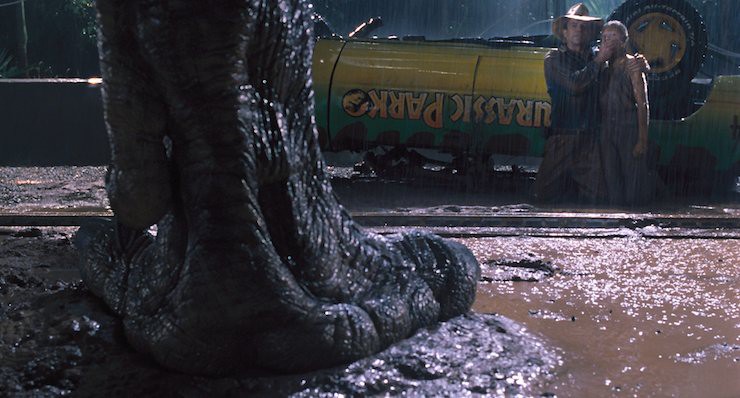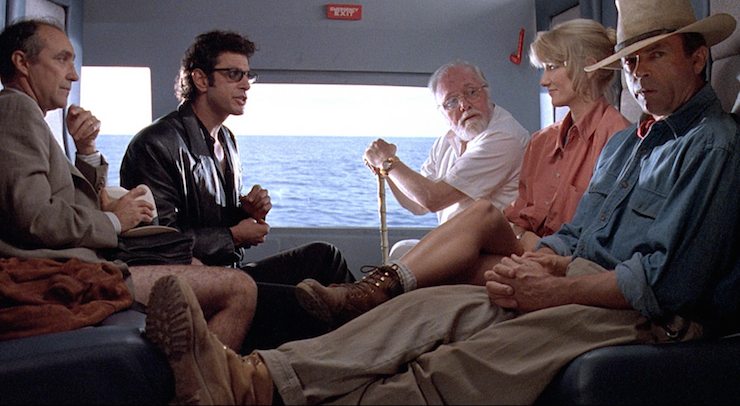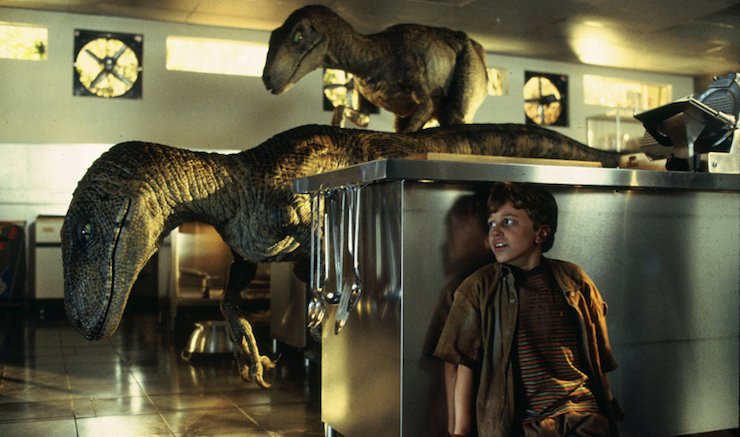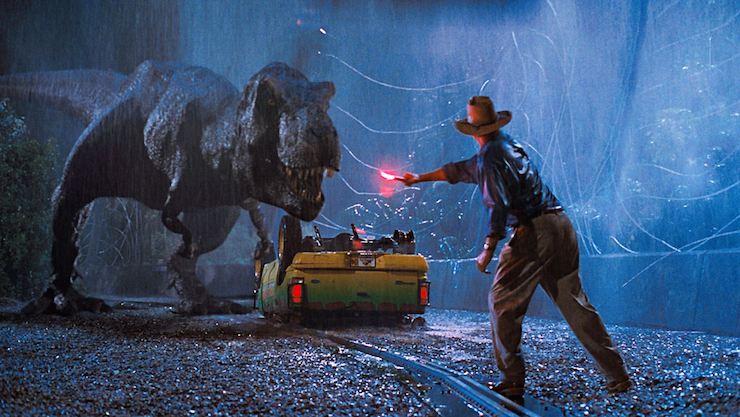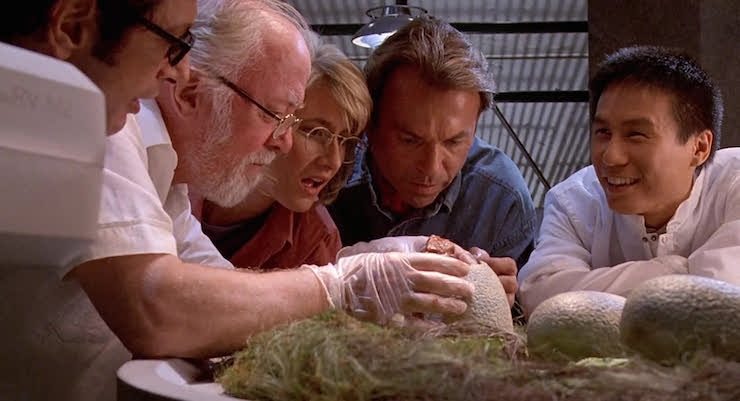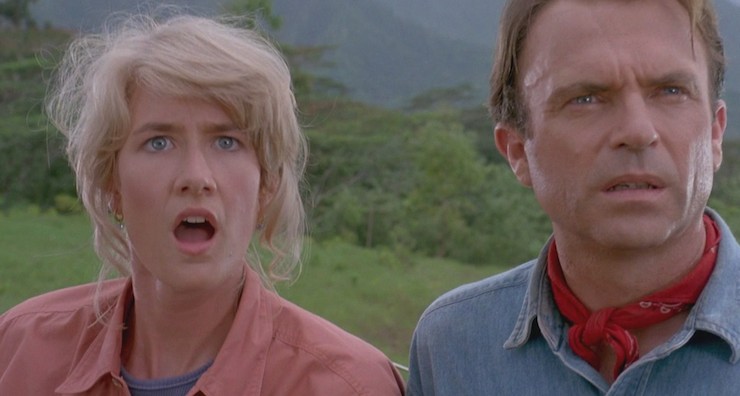Jurassic Park is special. And that’s a weird thing to get into because we don’t normally give high marks to popcorn films on principle. It’s seems unfair when they’re designed to engage us in a primal place, our most base emotions, to make us gasp and shriek and laugh in a darkened theater of strangers.
So the most obvious question becomes: what makes Jurassic Park special? Why this monster movie above so many others? (The answer is not simply “dinosaurs!” for everyone itching to say so. There have been many bad dinosaur movies. So many.)
This movie came out when I was a pretty young kid, and not the sort of kid who handled scary movies well. But I begged to see it—I’m sure plenty of kids from my generation remember doing the same. My parents (like many others, I have stats on this) kept my eyes covered for the opening raptor-mauling scene, and I know they were expecting to drag me out in tears. I half expected it myself. And I couldn’t really tell you what made me leave that theater with a sense of adoration that nostalgia would only strengthen as years went by. I can only tell you that nostalgia isn’t what makes this movie good.
As with all films that demand attention, Jurassic Park is a perfect storm of serendipity and movie science, a lot of smart decisions made alongside random acts of aren’t-we-lucky. It’s amazing that we got this movie. If the script hadn’t been overhauled or the effects hadn’t taken a few bounding leaps ahead of their time or the actors had refused to take the film seriously, it would have been lucky to get a cult following. But the world was ready for Jurassic Park, and so it was bequeathed to us, accompanied by a score by John Williams that can only be described as flipping majestic. (Really, without that soundtrack, I guarantee that the film would have a quarter of the impact. It has such a breathtaking effect that it might even outrank his Indy and Star Wars themes for sheer transformative power.)
You know what’s incredible about Jurassic Park? People spend the ENTIRE MOVIE discussing the ethics of what is happening on the island. The whole thing. It doesn’t stop after the first act, it doesn’t happen a couple times between one long action sequence of a movie. The whole film is about this discussion. This man-vs-nature do-we-have-the-right-to-play-God hypothesis. The dinosaurs show up for a grand total of fifteen minutes of screen time. Do you realize how rare that is these days? A modern blockbuster would give you three micro-scenes of chit-chat, max. And even then, it would only be to make certain that the film had a “theme” that all the action could turn on. Window dressing to support and center set pieces.
When you’re watching Jurassic Park, you can’t help but feel that the people making the movie, I don’t know, cared about the questions they were posing. They cared enough to make it clear that you shouldn’t create a backdrop of bioengineering and genetic hopscotch without expecting some questions in return. The film treated its audience as though they were as smart as the team of scientists sent to evaluate the park. As though your average moviegoer should feel free to air their opinions on cloning and rights to creation and social responsibility. We have to assume that the only reason Hollywood put up money for this is because the person who sold it in the studio exec office left their elevator pitch at “Dinosaur amusement park where people go to die” and omitted the rest.
Michael Crichton was responsible for the original script, which read very much like his novel. Unsurprisingly, Steven Spielberg asked for a rewrite. (If you’ve ever read a Crichton novel, you know he has great ideas. Great, dry, exposition-filled ideas that do not make for movie bedazzlement without some tweaking.) Spielberg himself was interested in the monster aspect of the film, insisting that he wanted to make a “sequel to Jaws, on land.” It’s easily some of his greatest work as a director, even just for his choices on where to direct the audience’s focus; the best example of this is the first reveal of the dinosaurs on screen—it takes forever to lay eyes on them, stuck first with lingering closeups of Dr. Grant and Dr. Sattler’s faces when they come into surprise contact with everything they’ve devoted their entire lives to. Even then, we begin with only one dinosaur, forced to wait for the full shot of the lake where the herds are milling and eating. This happens over and over again in the film, lingering on one person’s reaction to a dinosaur before we encounter it. We’re expected to wait, to anticipate, and it works to create both terror and wonder.
The special effects industry proved its worth to filmmaking on Jurassic Park to a degree that it hadn’t managed since the first Star Wars film was released. The plan was to use stop motion dinosaurs for long shots until Dennis Muren from ILM convinced Spielberg that he could create them better through CGI. When he made good on the promise, Spielberg told stop motion designer Phil Tippett that he was out of a job, to which the man replied, “Don’t you mean extinct?” The exchange was then commandeered into a piece of dialogue for the script.
The whole story of making Jurassic Park is rife with details like that. The script rewrite allowed for fuller interactions between the characters such as Ian Malcolm’s flirting, Dr. Grant and Dr. Sattler’s relationship, John Hammond’s silly little movie “ride” to introduce the park as a clever way of handling all the exposition. And sure, there’s a lot about the film that lands nowhere near the realm of accuracy; most of the dinosaurs that appear on screen are from the Cretaceous Period just to start. (Cretaceous Park definitely lacks a certain something in the name department, don’t pretend you disagree.) But accuracy isn’t what the film seeks to address—instead it’s a big picture story rendered next to tiny humans for scale. We can put ourselves in the shoes of three people staring down a T-Rex, even if we can’t imagine what went into creating one.
And the film wants you to feel that immediacy. It uses horror film tropes to force its audience into considering those larger questions. It reinforces those questions with smart parallels—Grant’s way of paleontology is about to go “extinct” via computer technology; the power-of-nature angle is exponentially magnified when the park failure is combined with a disastrous tropical storm; money causes literally every ill in the film, even when it is being used for supposedly praiseworthy purposes.
It’s fascinating that a movie so centered on the questionable acts committed by humanity contains very few outright despicable characters. Mr. Gennaro is perhaps the only solidly deplorable person in the film, concerned only with the money the park will make and abandoning Lex and Tim as soon as things get hairy. (Ian Malcolm was supposed to do the same, but Jeff Goldblum thought it played better for Malcolm to at least attempt heroism, and his poorly-considered flare gambit was created.) Even the primary baddie, Dennis Nedry, is hard to pin down; we don’t actually know what sort of financial trouble he got himself into, but John Hammond is rigid in his dismissal of the man’s problems. And considering Hammond’s penchant for unrealistic expectations, it’s entirely possible that Nedry was being treated unfairly (and paid a pittance) by InGen for the work he did.
The inability to reconcile nature’s resistance to control is one of the most important themes of the film, of course. Ian Malcolm tells the group that “life finds a way,” and it abruptly becomes the tale’s rallying cry, true in every conceivable way; the dinosaurs survive outside their engineering, the lost children survive with the help of a paleontologist who discovers his paternal side, humanity survives despite its meddling because it’s what we do. Every character in the film either understands this, or is made to by the course of events.
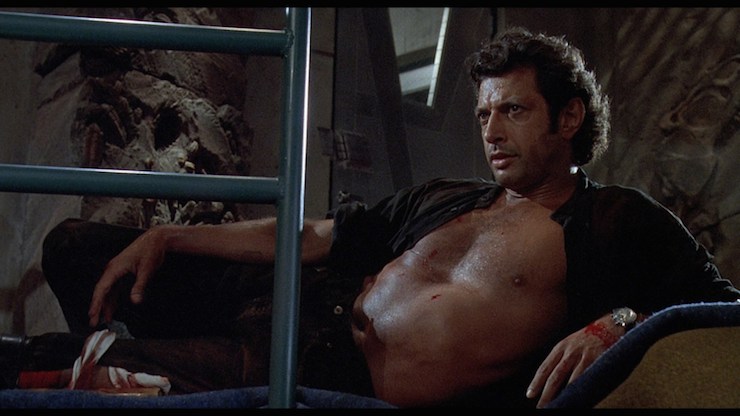
The problem lies in InGen’s arrogance, but even that can be peeled away to reveal a core of well-meaning intentions. (It’s not an excuse for anything that occurs, but it does make the journey more interesting.) John Hammond’s access to unlimited wealth is a problem not because he is greedy—like most of the periphery characters concerned with money—but because he is incapable of using that money wisely. His mantra throughout the film is that he “spared no expense” in creating the park, indicating that he believes money solves every problem. But he neglects to go by that mantra in the one place where it counted (Nedry) and finds himself paying the price.
Hammond’s aspirations are imperialistic to say the least (Malcolm instinctively touches on this when he rails against the “violence” of discovery as an act). There’s a throwaway line early in the film about how he has another theme park of some sort in Kenya, and he’s now moved on to land in Costa Rica for this particular project. But that instinct of unwelcome expansion comes clear in his conversation with Dr. Sattler, when he tells her about the first amusement park that he created once he’d left Scotland, a miniature imagined flea circus. As he grows impassioned his flawless English accent slips, revealing the Scottish brogue underneath, and we see that this man is all mask. The John Hammond that we perceive is a persona, one carefully cultivated as he worked to attain his status among people whom he likely felt inferior to. It puts his actions into perspective; his showmanship and fascination with spectacle, his desire to be philanthropic (wanting everyone to be able to visit the park regardless of means) while simultaneously taking land and scientific innovation and technology that he doesn’t understand for his very own and using it however he sees fit with no regard for secondary opinions.
It is up to Grant and Sattler to show Hammond where he has gone wrong (while Ian Malcolm is right, he’s too much of a “rock star” for Hammond to respect), and what makes them fascinating in those roles is the fact that they’re essentially billed as throwbacks. Neither one of them would have put on a lab coat and helped all the excited young geneticists piece together these species as living organisms. The same can be said of Mr. Muldoon, the park’s warden who came over from InGen’s Kenya site. These are people preoccupied with an older manner of exploration, imbued with reverence and respect for life despite professions that might not suggest so on first glance (digging up ancient bones and being an expert on game and hunting). At first, Grant uses that knowledge and reverence to frighten the kiddies—the boy hanging out at his dig for one—but he comes to realize that he can pass that reverence onto another generation via Lex and Tim; a new generation that hopefully won’t make the same mistakes that the current one is making.
And in the end, nature gets the last word. It’s so essential that the humans in this film don’t truly rescue themselves: when the raptors have Grant, Ellie, and the kids surrounded, it’s the T-Rex’s need for dinner that saves their lives. Not human ingenuity, but life finding its way, as it always will.
It would be remiss not to mention that most the things discussed here were changed as the film was going into production; Hammond was originally going to be just like his book counterpart, but Spielberg wanted him rendered in a more kindly light, relating to his love of showmanship. Grant’s change of heart about the kids was built into the script. Originally, the T-Rex didn’t show up at the end and human know-how saved the day—Spielberg had the big girl added into the finale because he considered her to be the film’s star. Change these things up and you have a different experience. We would have watched a different movie.
But as I said, we were ready for Jurassic Park… and life found a way to deliver it. And at over two decades old, it has a panache that films twenty years its junior can’t touch.
Emmet Asher-Perrin cannot believe that movie was going to end without the T-Rex eating some raptors. You can bug her on Twitter and Tumblr, and read more of her work here and elsewhere.










